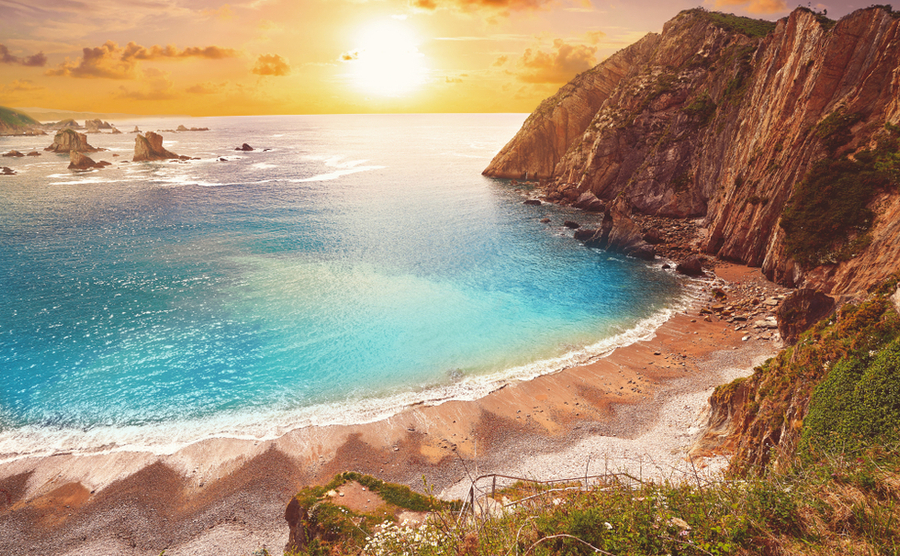A lusciously green region of northwestern Spain, Asturias, just became better connected to Madrid through the opening of a new high-speed railway. Find out why you will love this beautiful region.
A new high-speed railway connects Asturias better to Madrid
After nineteen years, Spain has finally launched its new high-speed railway from Madrid to Oviedo in Asturias, in the northwest. It will cut down the journey time from Madrid to Oviedo from 4 hours and 24 minutes to 3 hours and 10 minutes. Furthermore, once the new tracks are installed in the spring, the journey time will be cut to 2 hours and 42 minutes.
Last Wednesday (November 29th), President Pedro Sanchez, King Felipe IV and other politicians all gathered in Oviedo for the grand opening of the new high-speed railway. Construction started in 2004 and was intended to finish 2010 but the geological complexity of the area caused delays. It also saw the costs pushed up to €4 billion. The high-speed railway replaces a more winding stretch of railway that was first inaugurated in 1884 – then, it was an impressive feat. Now, Spain boasts of the second longest high-speed railway in the world, after China.
It is predicted that the new high-speed railway will give a positive economic boost to Asturias. Once an industrial and coal mining hubbub, many young people now choose to move out of the area. By making the area so much more easily accessible from Madrid, tourism is set to rapidly increase, with estimates that passengers will increase from 230,000 to 6000,000. Additionally, a joint study between the government and the University of Oviedo estimated that the train will add between €23 million and €40 million per year to the region’s economy.
Asturias, a different side to Spain
It is likely that the new high-speed railway will see a new influx of tourists discovering the Asturias region for themselves. And, indeed, for those keen to buy in Spain but unsettled on a location, there is much to love about Asturias.
Located in the northwest, Asturias promises a life in a breathtakingly beautiful natural setting, with fantastic cities to explore, and the intriguingly named Jurassic Coast.
Mountains, bears and tranquil beaches
Asturias is more than four-fifths mountainous. Its lush landscapes are the result of more rain than the rest of the country. If you are nervous about the potentially oppressive heat found in southern Spain, you’ll feel more content here. In Asturias, the hottest month is August with an average daily maximum of 23°C. While the coldest month is January with highs of 12 degrees. Winter is rainy, with Atlantic disturbances regularly passing over. The region benefits from 1,755 hours of sunshine per year.
Asturias is home to the Picos de Europa, which is made up of oak and beech groves. And if you want to spy Europe’s largest population of free-roaming brown bears, then head to Somiedo Natural Park. It is the place to be if you have a love for hiking and cycling.
Across the 400km long coast of Asturias, you’ll find unspoiled, tranquil beaches with fishing villages, lighthouses, and rocky cliff faces. Plus, the Jurassic Coast pairs lazing on the beach with the joy of spying a dinosaur footprint.
Cool cities and cider
As well as quiet villages, Asturias boasts of fantastic cities and towns, including Gijón and Aviles. The capital, Oviedo, is slowly on the rise (and will likely be helped by the new high-speed rail) as a tourist destination with effortless cool. It boasts of a lovely old town of stone-tiled streets, dotted with places to stop and shop; a landmark cathedral with impressive Gothic spirals; and a museum of fine art. Plus, the region is known for its cuisine: just see if you can work your way through sampling its forty-odd cheeses, its copious cider and famous rice pudding.
While not a popular choice among overseas buyers, property for sale in Asturias is notably budget friendly. There are plenty of village homes, farmhouses, and even affordable city apartments to choose from.
You might also like:














